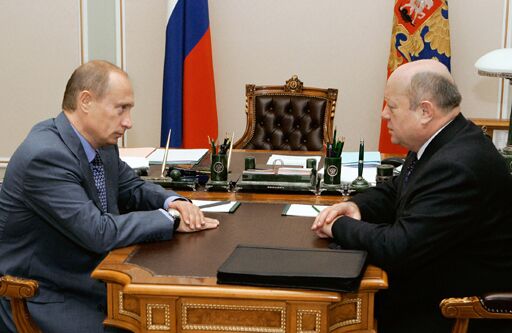
Kremlin Acquires Sibneft, Increases Global Influence
As the global energy market grows more volatile, the nations that supply energy commodities are gaining more influence. Consider, for example, the Russian government’s most recent acquisition.
Last Wednesday, Gazprom, the largest natural gas monopoly in Russia, reached an agreement to acquire 72.7 percent of the privately owned oil firm Sibneft. And Sibneft is just one of the energy companies in Gazprom’s sights.
As a state-run company, Gazprom is the bulldozer firm that Moscow has used to overpower more than a few privately owned energy companies in Russia. Over the past four years, the Russian government has become the dominant force in the Russian oil and gas sectors.
The scale of the Sibneft takeover is unprecedented in Russia. Gazprom was already the largest natural gas company in the country; the acquisition of Sibneft will give it a further 900,000 barrels of oil per day.
“In measures of barrels of oil equivalent (a means of allowing direct comparisons between producers of oil and natural gas), Gazprom now has 15 percent more stuff in the ground [than] even mighty Saudi Aramco” (Stratfor, September 29). Gazprom is now one of the largest oil and gas firms in the world—and the company is under the control of the Russian government.
The massive volume of oil and gas in Russia means that the nation is instrumental in the global energy market. The fact that Moscow now controls most of Russia’s energy assets is an alarming sign.
Stratfor highlighted the significance of the Gazprom purchase. “At the very least, any international energy companies wanting to operate in Russia will have to strike some sort of a deal with Gazprom” (ibid.). Gazprom’s latest purchase only strengthens the government’s ability to manage Russian resources—a worrying sign for the multinational oil and gas firms operating in and around Russian territory.
“Its sheer size breeds such political influence that any foreign companies seeking to invest in Russia will need to do so on terms that Gazprom dictates. This reality already has all but scuppered BP’s efforts to export natural gas from the Kovytka field near Irkutsk to China, and has resulted in the outright ejection of Chevron and Exxon from concessions offshore from Sakhalin Island, as well as French supermajor Total’s efforts to tap Russian natural gas itself” (ibid.). This acquisition has already disadvantaged two American energy companies.
As global demand for oil and gas grows, the influence of the nations with a supply of these commodities grows. Many oil-dependent nations are already building relationships with primary supply nations.
There is plenty of evidence to show that China, Japan and India are cozying up to Iran and Russia in order to secure energy supplies. Nations everywhere are scurrying to secure future energy. Thus, Russia, with its mammoth volumes of oil and gas, is finding itself in an enviable position within the global energy race. And thanks to its ownership of the largest oil and gas firms in the nation, the Russian government has systematically secured itself a seat in the center of worldwide energy politics.
As anti-American sentiment grows stronger in Russian politics, the United States is sure to feel the impacts of Moscow’s towering role in energy politics. So too will the European Union.
“On its own, this one company [Gazprom] already supplies the European Union with nearly half of its natural gas imports, and as it expands its oil portfolio, more and more European countries are going to find their energy prices—and thus their economic futures—decided in a Moscow board room where half the men are appointed by the Kremlin” (ibid.). This is an unnerving scenario for European leaders.
In spite of its present ailing condition, the European Union still aspires to assume a central role in global politics. That goal requires secure energy sources. Thus, we can expect Europe to expend considerable effort to lock down stable sources of energy to fuel its ambition for superpower status. Conflict with Russia is on the horizon.
Many energy analysts agree that worldwide demand for oil and gas will grow. As this occurs, we can expect nations with the largest oil deposits to become intoxicated with their newfound popularity. These nations will naturally tend to grow more bold and defiant in their foreign policies.
Two years ago, when Russian President Vladimir Putin was re-elected, the Trumpet stated, “Russia’s ‘single most strategic asset’ is oil. Mr. Putin is going to control that asset, no matter how much Western powers thunder in protest. Oil profits will help to place Russia back on the world stage as a dominant world power.” Since then, the Putin administration has taken great strides toward this goal.
The Russian government is back on stage as a dominant force. Moscow’s alliance with China is strengthening, and it has established itself as the main supplier of European energy. The nation is also proving to be a serious thorn in the side of the United States.
Watch for Russia’s growing preponderance to act as a catalyst for greater change in world politics. Europe will be driven to unite. By forming alliances with Iran and other nations hostile to America, Russia will hijack American interests and handicap U.S. foreign policy. Russian oil and gas will continue to fuel the rise of China.
To understand the future of Russia more thoroughly, read our free booklet Russia and China in Prophecy.
